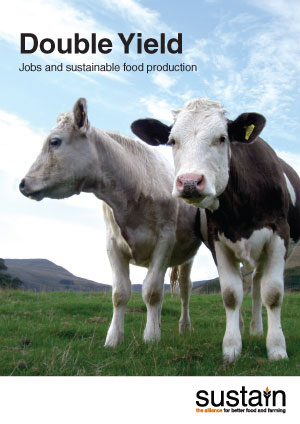Reports • Sustainable Farming Campaign
Double Yield: Jobs and sustainable food production
This is a 2015 republication of the original 1997 report, and includes a new foreword by Vicki Hird.
Report contents
Foreword 1997
Foreword 2015
Part 1 Executive summary
1.1 The potential for increasing employment opportunities
1.2 Policies for a Double Yield
Part 2 Why food, why jobs and why now
2.1 Introduction
2.1.1 Jobs and the environment
2.1.2 Agriculture, jobs and the environment
2.2 The rural economy and employment
2.2.1 An urban view of rural life?
2.2.2 Rural poverty and employment
2.2.3 Working the land
2.2.4 Where have all the farms gone?
2.2.5 The Government response: Rural and farm policy
2.2.6 Sustainable Communities and food chain
2.3 The Environmental impacts of current food production
2.4 Sustainable food production is the solution
2.4.1 What makes a sustainable food system?
2.4.2 Good for the environment and good for economies
Part 3 Steps to rural employment
3.1 Farming and food systems
3.1.1 Organic Farming
3.1.2 Other integrated farming systems
3.1.3 The local food factor
3.1.4 Community gardens
3.2 Sector case studies
3.2.1 Horticultural production
3.2.2 Egg production
3.2.3 Orchards
3.2.4 Whole Farming systems
3.3 Conservation based farming
3.3.1 Agri-environment schemes and their socio-economic impacts
3.3.2 Wildlife, jobs and access
3.4 Tourist help or hindrance?
3.5 Collaborative approaches
3.5.1 The benefits of collaboration
3.5.2 The Worker cooperative
3.6 The knowledge deficit - training for change
Part 4 Double jeopardy: farm policies and employment
4.1 The Common Agricultural Policy
4.1.1 The Case for Reform
4.1.2 What Kind of Reform?
A whole country Agri-environment programme
Basing payments on labour use
Modulation to maintain diversity
Better support for Early Retirement and New Entrants
Why not remove all support for farming?
4.2 Structural Funds
4.3 A policy of export
Part 5 The double yield conclusions and recommendations
5.1 Conclusions
5.2 Recommendations
Published Monday 27 April 2015
Sustainable Farming Campaign: Sustain encourages integration of sustainable food and farming into local, regional and national government policies.
